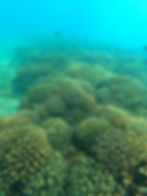Our Story
The Eastern Tropical Pacific (ETP) Coral Restoration Network was formed by the CRC in 2019 with initial participation from México, El Salvador, Costa Rica, and Colombia. The network is currently undergoing a reorganization process to better support the growing number of coral restoration initiatives across the region.
Known as the Red Pacífico Tropical Oriental (Red PTO) the ETP regional group now includes representatives from six countries—adding Ecuador and Chile to the original four—and encompasses 23 institutions. Its members span a broad range of stakeholders, including academic researchers, community-based coral groups, NGOs, and government agencies.

Geographical Area of Focus: México, El Salvador, Costa Rica, Colombia, Ecuador and Chile (Eastern Island).
Restoration in the Region
Coral reefs in the ETP extend from the Baja California Peninsula (México) southward to Ecuador. These reefs are largely oceanographically isolated from the broader Pacific, and unlike other reef provinces characterized by continuous barrier reef structures, ETP reefs typically form small and scattered patches. As such, they are often referred to as coral communities rather than true reefs—yet they support a high biodiversity. Corals in this region are considered relatively resilient, having adapted to extreme and suboptimal environmental conditions. This resilience is reflected in their genetic characteristics and life history strategies.
Restoration efforts in the ETP began as early as 2013 in the Mexican Central Pacific, with subsequent projects launched in Costa Rica and Colombia. More recently, initiatives have expanded to El Salvador and Ecuador, with new projects set to begin on Easter Island (Chile).
Most restoration work has focused on species within the genus Pocillopora, although Pavona, Porites, and Gardineroseris are also being propagated. Several projects include routine monitoring of environmental parameters and ecological indicators. Restoration strategies primarily rely on in situ coral propagation followed by transplantation, often using ropes, trees, or Mars reef stars. At least two ex situ coral cultivation facilities are currently operational, with others under development. The region faces persistent challenges from tourism, fishing, and unsustainable land-use practices linked to coastal development and agriculture, which has lead to increased sedimentation and nutrient loading. Additionally, widespread coral bleaching occurred across much of the region in 2023 due to ocean warming—with Ecuador being a notable exception.





Our Priorities
-
Identify key research gaps and establish mechanisms for rapid knowledge exchange to enhance coordination and inform timely action across coral restoration initiatives in the region.
-
Develop and implement a standardized coral restoration protocol tailored to the ETP, enabling consistent comparisons of coral growth, survival, and overall restoration success.
-
Conduct a regional-scale genetic analysis of foundational reef-building coral species, with an emphasis on understanding patterns of connectivity and genetic diversity—particularly within the genus Pocillopora.
-
Investigate the sexual reproduction dynamics of key coral species to support assisted reproductive interventions and improve understanding of reproductive timing, larval dispersal, and connectivity.
-
Create and integrate a centralized digital platform to facilitate the sharing of coral restoration research, fieldwork updates, protocols, and training opportunities across the ETP region.
Image from Güiri, Culebra Reef Gardens, Costa Rica.
What are we working on?
-
Reorganization and governance of the group to better represent restoration practitioners across all ETP countries.
-
Improving collaboration amongst the various restoration efforts, particularly exploring how to tackle the larger barriers in research and collaboration that would benefit all members of the network, for example on coral genetics and larval dispersal at population scales.
Learn more!
The Eastern Tropical Pacific Regional Group is always looking for new members. Come collaborate with us today!

Image of Profundo Pavonas, from Islas Marietas, Mexico by LEMAC Corales de Paz.
ETP Coral Restoration Workshop
-
From August 18 to 20, 2025, the Eastern Tropical Pacific (ETP) Coral Restoration Workshop was held in San José, Costa Rica, sponsored by the Coral Restoration Consortium (CRC) and organized by CIMAR (University of Costa Rica), Universidad San Francisco de Quito, and the University of Guadalajara.
-
Over 25 participants from six countries — Mexico, El Salvador, Costa Rica, Colombia, Ecuador, and Chile — representing academic institutions, government agencies, and NGOs convened to reactivate and strengthen the ETP Coral Restoration Network, fostering regional cooperation among initiatives facing similar environmental challenges.
-
During the three-day event, participants reviewed restoration protocols, shared experiences, and conducted a regional SWOT analysis to identify common strengths, opportunities, weaknesses, and threats. The workshop concluded with priority actions including standardizing restoration and monitoring methodologies, creating a regional open-access data repository, establishing thematic working groups, and developing a Regional Coral Restoration and Monitoring Manual.
-
The CRC's support was essential in strengthening regional collaboration and ensuring local restoration efforts align with the global movement to enhance the ecological and social resilience of coral reef ecosystems.
Images from the workshop!

Margarita Brandt
Chair

Paola Rodriguez
Chair
Universidad de Guadalajara, Centro Universitario de la Costa
Puerto Vallarta, México
Meet the Eastern Tropical Pacific Regional Group Leadership Team
Made up of experts from around the world. The ETP Regional Group is always looking to recruit new members!




